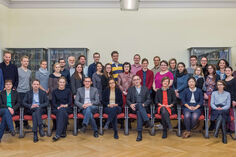Philosophical Psychology Lab
Philosophy and Psychology: A Close Connection
Philosophy and psychology have always been thematically intertwined. As early as De Anima by Aristotle or the Stoic moral psychology, comprehensive analyses of various dimensions of human experience and behavior can be found. These studies provide profound insights into key aspects of human experience, such as thinking, feeling, and willing, and shed light on the complex relationship between body and mind – fundamental topics of psychology as a philosophical subdiscipline.
While psychology emerged from philosophy in the late 19th century and established itself as an independent discipline in the early 20th century, the connection between the two fields has persisted due to their thematic overlaps. Although the second half of the 20th century saw a methodologically motivated differentiation from philosophy, current discourses highlight a renewed emphasis on interdisciplinary collaboration between philosophical and psychological approaches.
In this context, philosophical psychology has established itself as a distinct research field over the past two decades, increasingly functioning as a bridge between philosophy and empirical psychology.
The Role of Philosophical Psychology:
Philosophical psychology not only reflects on philosophical foundations and epistemological aspects of psychological research but also aims to integrate empirical findings with philosophical theory. Guided by thematic questions and the phenomena of interest, it adopts a multiparadigmatic and multimethodological approach, striving to synthesize various forms of knowledge and evidence.
It incorporates the full range of quantitative and qualitative research from psychology and related social and cognitive sciences while combining these with contemporary philosophical approaches – particularly phenomenology, philosophy of mind, and enactivism. This synthesis of different knowledge forms and evidence types enables new perspectives and a deeper understanding of the diverse intersections between psychological and philosophical questions.
The Philosophical Psychology Lab:
Founded in 2024, the Philosophical Psychology Lab focuses on philosophical psychology, with a particular emphasis on clinical phenomena related to various psychopathologies. A central focus lies on phenomenological psychopathology, particularly on theory development supported by empirical research. Among other topics, the lab highlights questions of self-awareness, emotional experience, and the role of social interactions.
The goal is to utilize empirical findings for phenomenological reflection while simultaneously designing and planning empirical research based on phenomenological theories. Furthermore, the lab embraces openness to diverse philosophical paradigms and fosters dialogue with related disciplines, particularly the humanities.
Research Stays, Internship Opportunities, and Theses:
In addition to research stays, the Philosophical Psychology Lab offers students the opportunity to undertake a mandatory internship as part of their psychology studies. This provides a unique chance to gain insights into research practices at the intersection of philosophy and psychology and to independently manage smaller projects or subprojects.
Theses in the field of philosophy at Heidelberg University can also be supervised at the Philosophical Psychology Lab.
Master’s theses in psychology, particularly those involving empirical research questions, can likewise be supervised upon agreement.
Scientific Director and Contact:
Dr. Philipp Schmidt-Boddy
philipp.schmidt-boddy(at)uni-heidelberg.de
Aktuelle Studien
We are currently conducting an online study on inner speech, emotional experience, and self-perception (in German):
Further information
Participating in the study
Activities




